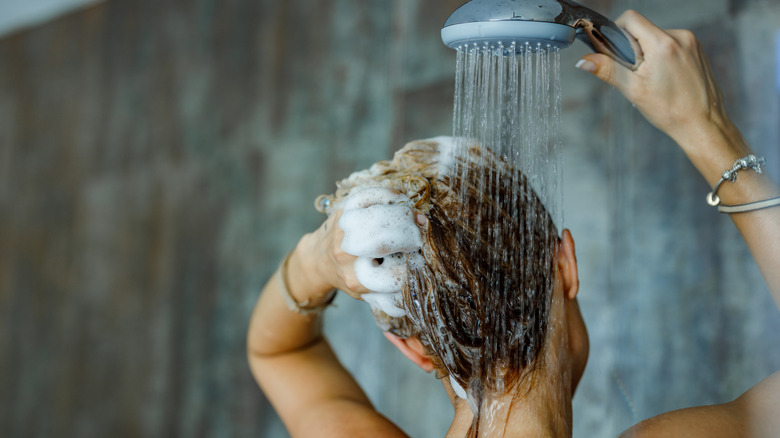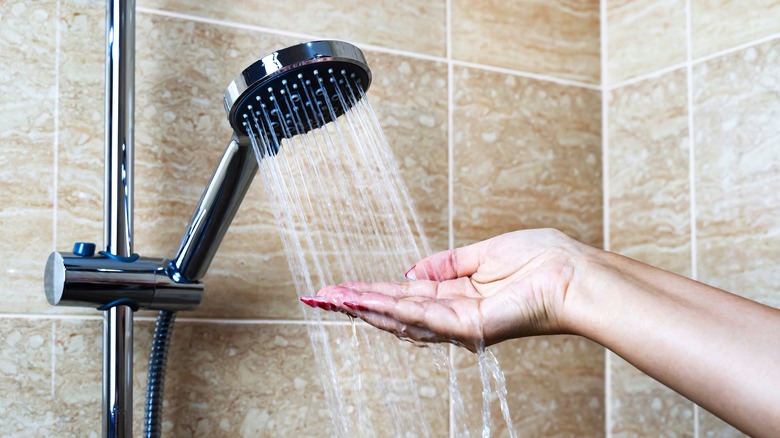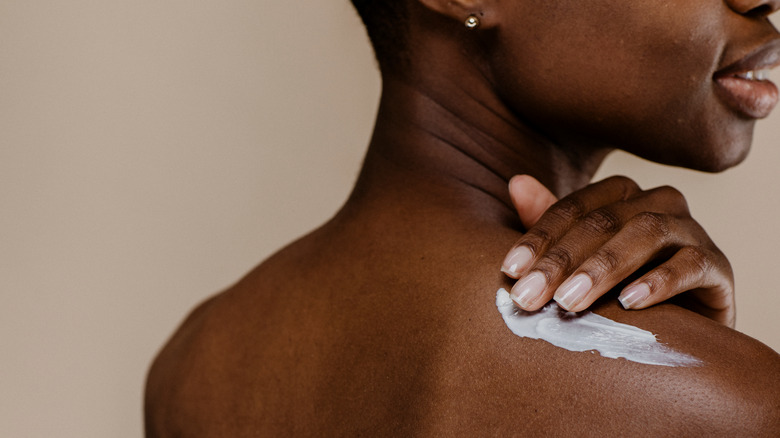What's The Real Deal With Hard Water's Impact On Skin And Hair? It's Complicated
We may receive a commission on purchases made from links.
When it comes to the water you drink, it's pretty easy to identify the difference between bottled and tap water. While one tastes fresh, the other tastes cloudy — and it makes sense to assume that's what all unpurified water is. Unfortunately, this is not the case for the many sources where unpurified water streams are. While we can't change the sources that bathe, cleanse, and hydrate you, we can provide more information on its impact on skin and hair.
Before we get started, let's define some vocabulary. Hard water refers to what we typically receive from our showers, the hot water that ends up clouding any reflective surface in our bathroom. It's laden with minerals like calcium and magnesium that can leave a cloudy residue, and can only be combated by things like dishwasher detergent or soap scum remover made specifically for hard water.
On the other hand, soft water refers to water that's high in sodium and free from the toxins that hard water is made of. It can be found naturally in the state of glaciers, rainwater, and icebergs. It's also the water that, usually once filtered, we drink. While many are lucky to have access to clean drinking water, hard water still plays its tricks in other forms. So how harmful is hard water, really? Are there ways to avoid it? Let's dive in.
It disrupts the skin barrier
While hard water has some essential minerals, it's too strong for the barrier of the skin. "Calcium and magnesium in hard water react with fatty acids in your soap and shampoo to form chemicals that coagulate," board-certified dermatologist Tess Mauricio told Real Simple. "As a result, your skin doesn't get cleaned properly and the chemicals leave a residue on your skin." A build-up of residue can lead to irritable skin, which in some cases can cause acne, eczema, and other skin conditions.
It can also affect the skin on your scalp. If you've ever had an itchy, irritable scalp — and the solution wasn't based on dandruff or other conditions of the scalp — it's likely a result of showering with hard water. "You may notice your hair lose its color and not look as shiny with long-term use," Mauricio explained. You can also notice the results of hard water when your shampoo doesn't lather well or you don't feel a sense of cleanliness after showering. The immediate effects of hard water might not be so hard to miss.
Is it really that bad?
Thankfully, most people don't experience the long-term effects of hard water, even if they're using unfiltered water in their day-to-day lives. If your showers and hair washing days leave you feeling clean and satisfied, then you're likely fine to continue using hard water (but be weary of any changes in skin, body, and hair). If you are experiencing the side effects of hard water, however, then it may be time to reduce your exposure to it and find alternatives.
"For those with really sensitive skin, even laundering clothes in hard water can cause skin irritation," Mauricio explained. If you're a frequent traveler, differences in water exposure and hardness can leave you feeling itchy with build-up in your hair and on your face. On the other hand, experiencing levels of soft water can leave you feeling clean after a shower or putting on clothes from a fresh load of laundry. Be conscious of how your skin and hair changes in different locations — it may help you find solution-oriented results.
There are solutions to hard water
If you've realized that hard water is affecting your day-to-day routine, we've got you. One of the most common and efficient ways to deal with hard water is by installing a shower head that can filter out strong minerals. There are a number of popular shower filters for every budget, including the 15 Stage Shower Filter ($17), AquaBliss High Output Revitalizing Shower Filter ($36), and The Jolie Filtered Showerhead ($165).
Additionally, you can try using products that combat the effects of hard water, like micellar water cleansers, body washes for dry skin, and shampoos made with apple cider vinegar. It is also recommended that if hard water must be used, it shouldn't be too hot — the higher the temperature you shower in, the drier your skin will be. You can also incorporate a moisturizing body lotion into your post-shower routine to provide the extra hydration your body craves. Above all, listen to what your body is telling you and meet its needs wherever you can.



